Business Law Case Study: Louth v Diprose (1992) Unconscionable Conduct
VerifiedAdded on 2023/06/15
|6
|977
|131
Case Study
AI Summary
This case study delves into the Australian High Court case of Louth v Diprose (1992), focusing on the legal concept of unconscionable conduct within contract law. The case revolves around Louis Diprose, who purchased a house for Carol Louth, with whom he had a complex relationship. When the relationship soured, Diprose sought to reclaim the property, leading to a legal battle. The court examined whether Louth had acted unconscionably by exploiting Diprose's emotional vulnerability and dependence. The analysis explores the elements of unconscionability, including inequality of bargaining power, undue influence, and exploitation of weakness, referencing relevant legal principles and other cases such as Lloyds Bank Ltd v Bundy. The study concludes that Louth's conduct was indeed unconscionable, leading to the dismissal of the initial trial and the eventual transfer of the land back to Diprose.
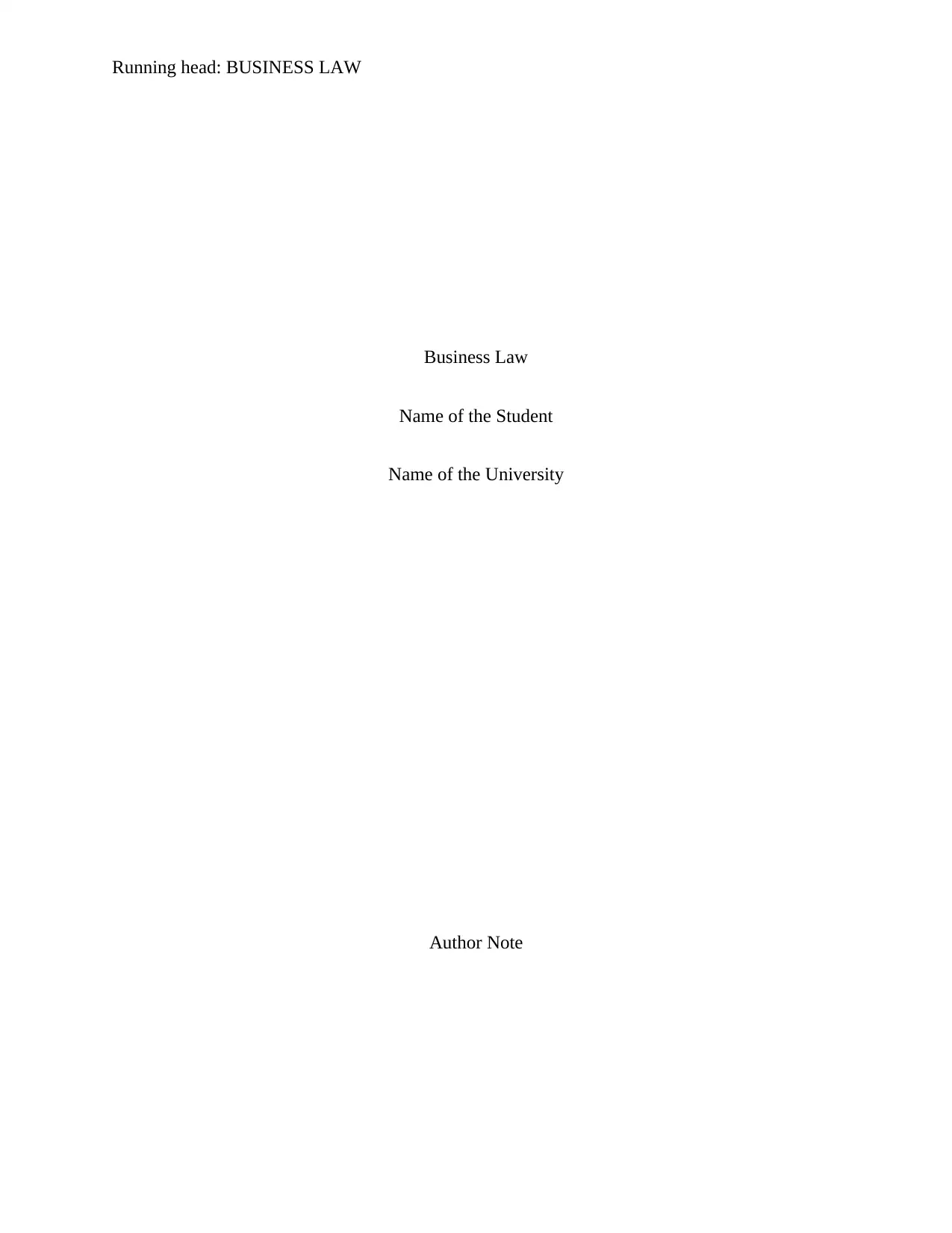
Running head: BUSINESS LAW
Business Law
Name of the Student
Name of the University
Author Note
Business Law
Name of the Student
Name of the University
Author Note
Paraphrase This Document
Need a fresh take? Get an instant paraphrase of this document with our AI Paraphraser
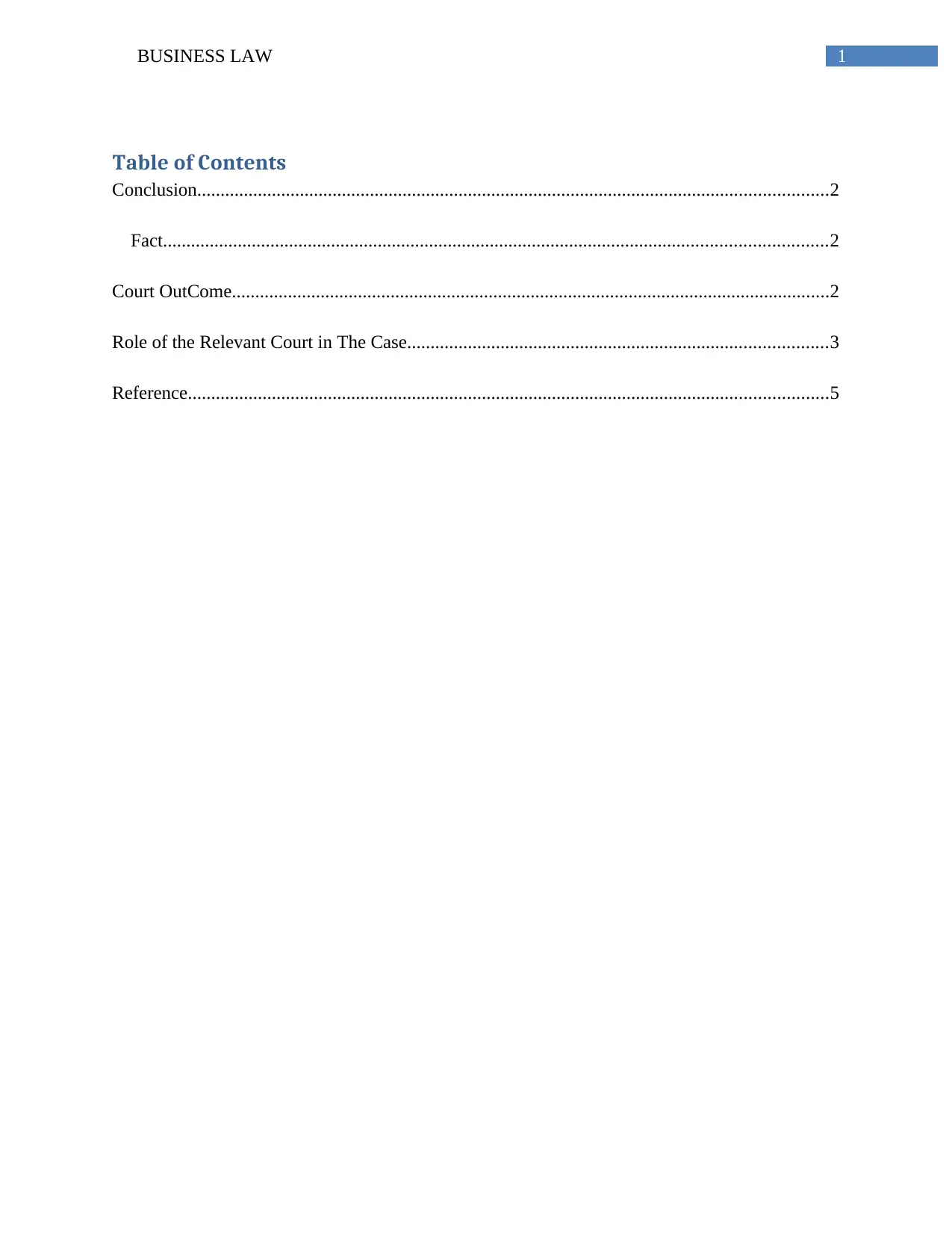
1BUSINESS LAW
Table of Contents
Conclusion.......................................................................................................................................2
Fact..............................................................................................................................................2
Court OutCome................................................................................................................................2
Role of the Relevant Court in The Case..........................................................................................3
Reference.........................................................................................................................................5
Table of Contents
Conclusion.......................................................................................................................................2
Fact..............................................................................................................................................2
Court OutCome................................................................................................................................2
Role of the Relevant Court in The Case..........................................................................................3
Reference.........................................................................................................................................5
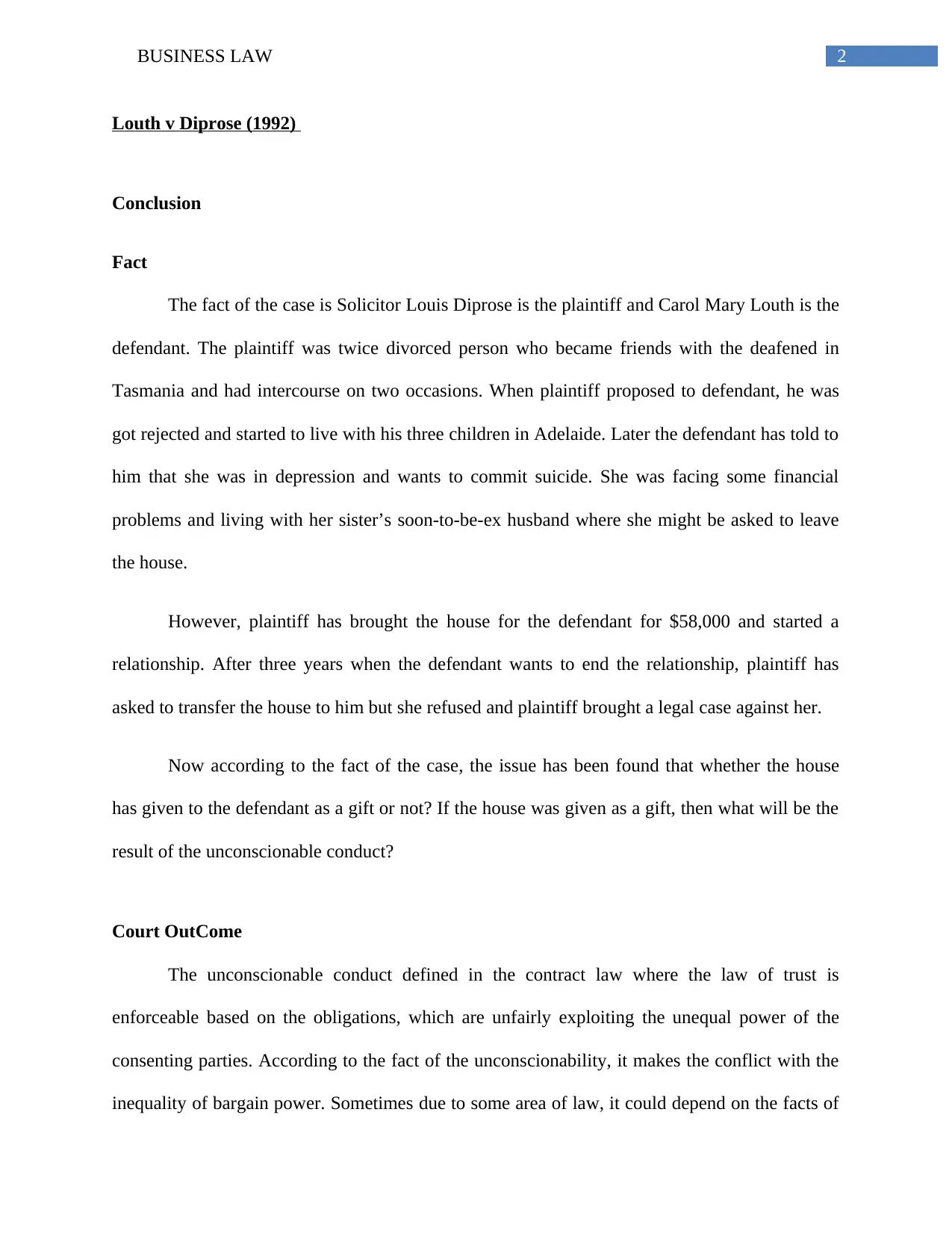
2BUSINESS LAW
Louth v Diprose (1992)
Conclusion
Fact
The fact of the case is Solicitor Louis Diprose is the plaintiff and Carol Mary Louth is the
defendant. The plaintiff was twice divorced person who became friends with the deafened in
Tasmania and had intercourse on two occasions. When plaintiff proposed to defendant, he was
got rejected and started to live with his three children in Adelaide. Later the defendant has told to
him that she was in depression and wants to commit suicide. She was facing some financial
problems and living with her sister’s soon-to-be-ex husband where she might be asked to leave
the house.
However, plaintiff has brought the house for the defendant for $58,000 and started a
relationship. After three years when the defendant wants to end the relationship, plaintiff has
asked to transfer the house to him but she refused and plaintiff brought a legal case against her.
Now according to the fact of the case, the issue has been found that whether the house
has given to the defendant as a gift or not? If the house was given as a gift, then what will be the
result of the unconscionable conduct?
Court OutCome
The unconscionable conduct defined in the contract law where the law of trust is
enforceable based on the obligations, which are unfairly exploiting the unequal power of the
consenting parties. According to the fact of the unconscionability, it makes the conflict with the
inequality of bargain power. Sometimes due to some area of law, it could depend on the facts of
Louth v Diprose (1992)
Conclusion
Fact
The fact of the case is Solicitor Louis Diprose is the plaintiff and Carol Mary Louth is the
defendant. The plaintiff was twice divorced person who became friends with the deafened in
Tasmania and had intercourse on two occasions. When plaintiff proposed to defendant, he was
got rejected and started to live with his three children in Adelaide. Later the defendant has told to
him that she was in depression and wants to commit suicide. She was facing some financial
problems and living with her sister’s soon-to-be-ex husband where she might be asked to leave
the house.
However, plaintiff has brought the house for the defendant for $58,000 and started a
relationship. After three years when the defendant wants to end the relationship, plaintiff has
asked to transfer the house to him but she refused and plaintiff brought a legal case against her.
Now according to the fact of the case, the issue has been found that whether the house
has given to the defendant as a gift or not? If the house was given as a gift, then what will be the
result of the unconscionable conduct?
Court OutCome
The unconscionable conduct defined in the contract law where the law of trust is
enforceable based on the obligations, which are unfairly exploiting the unequal power of the
consenting parties. According to the fact of the unconscionability, it makes the conflict with the
inequality of bargain power. Sometimes due to some area of law, it could depend on the facts of
⊘ This is a preview!⊘
Do you want full access?
Subscribe today to unlock all pages.

Trusted by 1+ million students worldwide
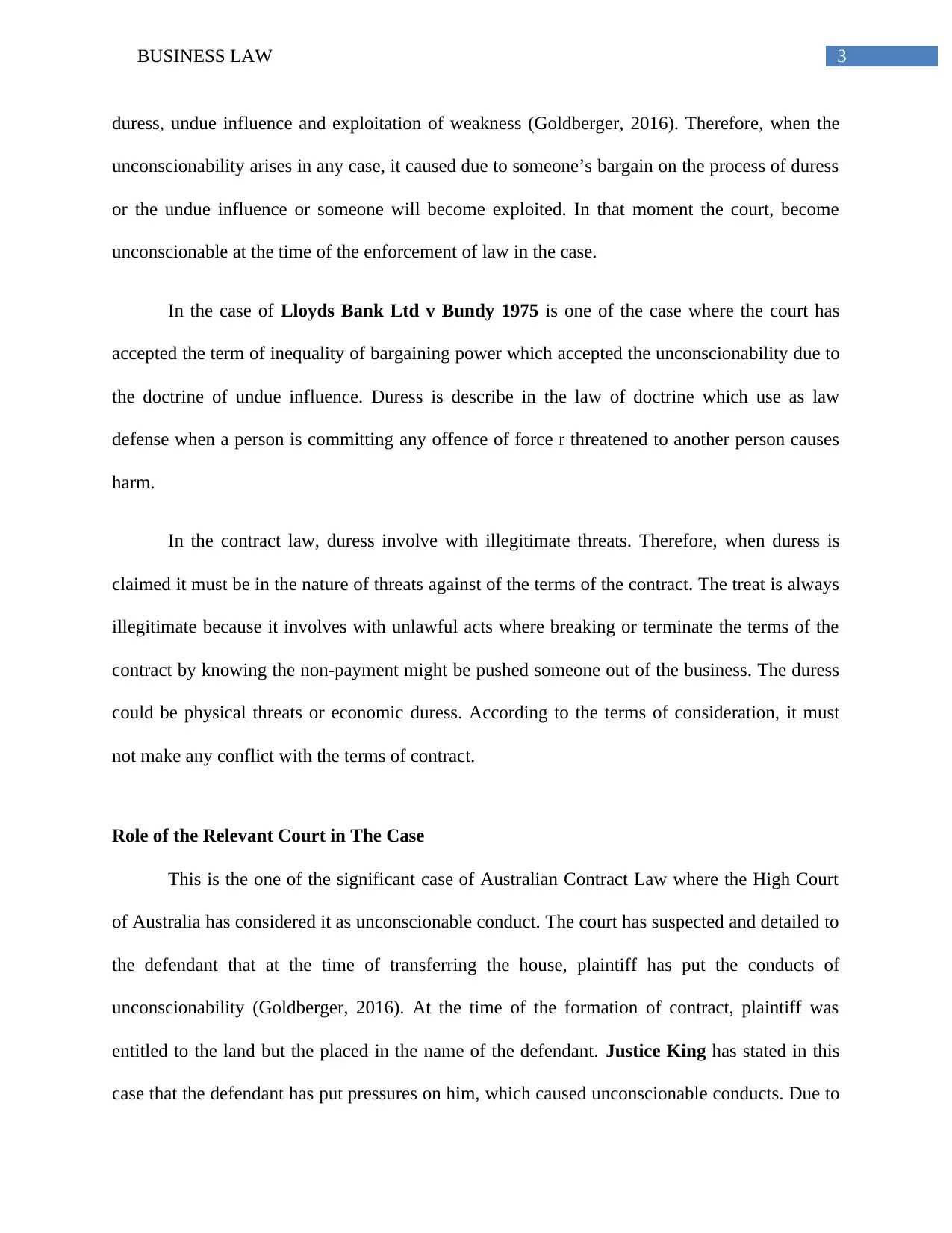
3BUSINESS LAW
duress, undue influence and exploitation of weakness (Goldberger, 2016). Therefore, when the
unconscionability arises in any case, it caused due to someone’s bargain on the process of duress
or the undue influence or someone will become exploited. In that moment the court, become
unconscionable at the time of the enforcement of law in the case.
In the case of Lloyds Bank Ltd v Bundy 1975 is one of the case where the court has
accepted the term of inequality of bargaining power which accepted the unconscionability due to
the doctrine of undue influence. Duress is describe in the law of doctrine which use as law
defense when a person is committing any offence of force r threatened to another person causes
harm.
In the contract law, duress involve with illegitimate threats. Therefore, when duress is
claimed it must be in the nature of threats against of the terms of the contract. The treat is always
illegitimate because it involves with unlawful acts where breaking or terminate the terms of the
contract by knowing the non-payment might be pushed someone out of the business. The duress
could be physical threats or economic duress. According to the terms of consideration, it must
not make any conflict with the terms of contract.
Role of the Relevant Court in The Case
This is the one of the significant case of Australian Contract Law where the High Court
of Australia has considered it as unconscionable conduct. The court has suspected and detailed to
the defendant that at the time of transferring the house, plaintiff has put the conducts of
unconscionability (Goldberger, 2016). At the time of the formation of contract, plaintiff was
entitled to the land but the placed in the name of the defendant. Justice King has stated in this
case that the defendant has put pressures on him, which caused unconscionable conducts. Due to
duress, undue influence and exploitation of weakness (Goldberger, 2016). Therefore, when the
unconscionability arises in any case, it caused due to someone’s bargain on the process of duress
or the undue influence or someone will become exploited. In that moment the court, become
unconscionable at the time of the enforcement of law in the case.
In the case of Lloyds Bank Ltd v Bundy 1975 is one of the case where the court has
accepted the term of inequality of bargaining power which accepted the unconscionability due to
the doctrine of undue influence. Duress is describe in the law of doctrine which use as law
defense when a person is committing any offence of force r threatened to another person causes
harm.
In the contract law, duress involve with illegitimate threats. Therefore, when duress is
claimed it must be in the nature of threats against of the terms of the contract. The treat is always
illegitimate because it involves with unlawful acts where breaking or terminate the terms of the
contract by knowing the non-payment might be pushed someone out of the business. The duress
could be physical threats or economic duress. According to the terms of consideration, it must
not make any conflict with the terms of contract.
Role of the Relevant Court in The Case
This is the one of the significant case of Australian Contract Law where the High Court
of Australia has considered it as unconscionable conduct. The court has suspected and detailed to
the defendant that at the time of transferring the house, plaintiff has put the conducts of
unconscionability (Goldberger, 2016). At the time of the formation of contract, plaintiff was
entitled to the land but the placed in the name of the defendant. Justice King has stated in this
case that the defendant has put pressures on him, which caused unconscionable conducts. Due to
Paraphrase This Document
Need a fresh take? Get an instant paraphrase of this document with our AI Paraphraser
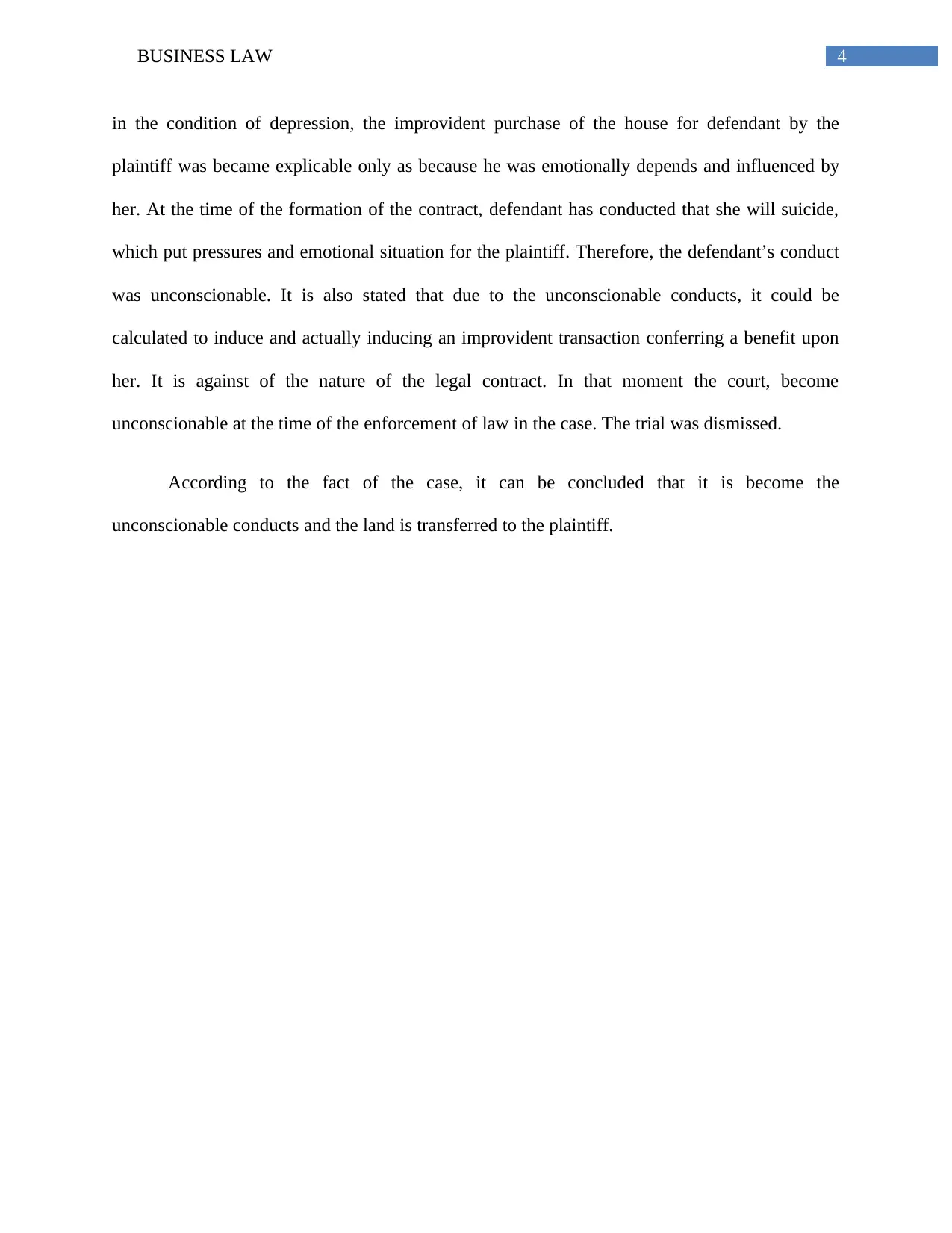
4BUSINESS LAW
in the condition of depression, the improvident purchase of the house for defendant by the
plaintiff was became explicable only as because he was emotionally depends and influenced by
her. At the time of the formation of the contract, defendant has conducted that she will suicide,
which put pressures and emotional situation for the plaintiff. Therefore, the defendant’s conduct
was unconscionable. It is also stated that due to the unconscionable conducts, it could be
calculated to induce and actually inducing an improvident transaction conferring a benefit upon
her. It is against of the nature of the legal contract. In that moment the court, become
unconscionable at the time of the enforcement of law in the case. The trial was dismissed.
According to the fact of the case, it can be concluded that it is become the
unconscionable conducts and the land is transferred to the plaintiff.
in the condition of depression, the improvident purchase of the house for defendant by the
plaintiff was became explicable only as because he was emotionally depends and influenced by
her. At the time of the formation of the contract, defendant has conducted that she will suicide,
which put pressures and emotional situation for the plaintiff. Therefore, the defendant’s conduct
was unconscionable. It is also stated that due to the unconscionable conducts, it could be
calculated to induce and actually inducing an improvident transaction conferring a benefit upon
her. It is against of the nature of the legal contract. In that moment the court, become
unconscionable at the time of the enforcement of law in the case. The trial was dismissed.
According to the fact of the case, it can be concluded that it is become the
unconscionable conducts and the land is transferred to the plaintiff.
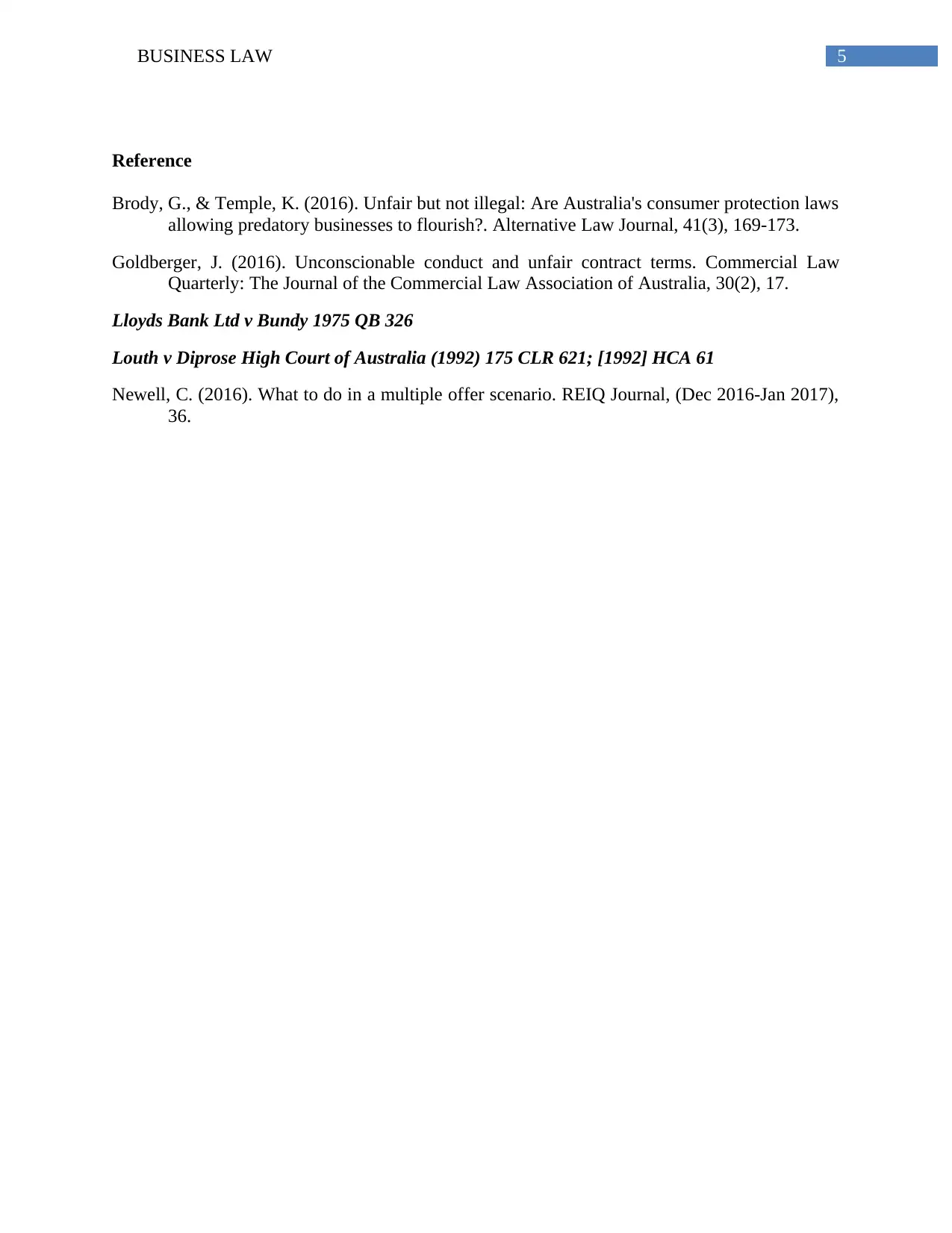
5BUSINESS LAW
Reference
Brody, G., & Temple, K. (2016). Unfair but not illegal: Are Australia's consumer protection laws
allowing predatory businesses to flourish?. Alternative Law Journal, 41(3), 169-173.
Goldberger, J. (2016). Unconscionable conduct and unfair contract terms. Commercial Law
Quarterly: The Journal of the Commercial Law Association of Australia, 30(2), 17.
Lloyds Bank Ltd v Bundy 1975 QB 326
Louth v Diprose High Court of Australia (1992) 175 CLR 621; [1992] HCA 61
Newell, C. (2016). What to do in a multiple offer scenario. REIQ Journal, (Dec 2016-Jan 2017),
36.
Reference
Brody, G., & Temple, K. (2016). Unfair but not illegal: Are Australia's consumer protection laws
allowing predatory businesses to flourish?. Alternative Law Journal, 41(3), 169-173.
Goldberger, J. (2016). Unconscionable conduct and unfair contract terms. Commercial Law
Quarterly: The Journal of the Commercial Law Association of Australia, 30(2), 17.
Lloyds Bank Ltd v Bundy 1975 QB 326
Louth v Diprose High Court of Australia (1992) 175 CLR 621; [1992] HCA 61
Newell, C. (2016). What to do in a multiple offer scenario. REIQ Journal, (Dec 2016-Jan 2017),
36.
⊘ This is a preview!⊘
Do you want full access?
Subscribe today to unlock all pages.

Trusted by 1+ million students worldwide
1 out of 6
Related Documents
Your All-in-One AI-Powered Toolkit for Academic Success.
+13062052269
info@desklib.com
Available 24*7 on WhatsApp / Email
![[object Object]](/_next/static/media/star-bottom.7253800d.svg)
Unlock your academic potential
Copyright © 2020–2025 A2Z Services. All Rights Reserved. Developed and managed by ZUCOL.




